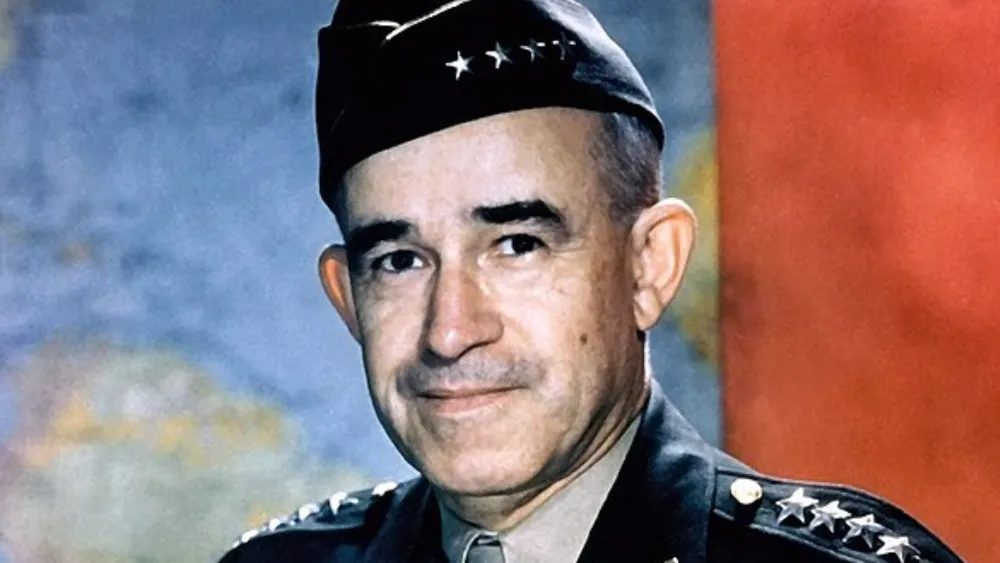Omar Nelson Bradley distinguished himself as a senior officer in the United States Army during and after World War II. Ultimately, he achieved the esteemed rank of General of the Army. His historic role extended to becoming the inaugural chairman of the Joint Chiefs of Staff. It is when he played an important role in shaping U.S. military policy during the Korean War.
The Humble Beginnings of a Future Leader
The Crucible of Leadership Bradley’s Military Career commenced with his service in World War I. He enrolled in the United States Military Academy at West Point in 1911, graduating in 1915 as part of the “Class the Stars Fell On,” a nickname given to the class due to the remarkable achievements of its members.
World War I saw Bradley honing his skills as a young officer, rapidly rising through the ranks and gaining valuable command experience.
Bradley stood out in the years between the World Wars because of his commitment to his career and his never-ending quest for knowledge.
He went to the Army War College in Washington, D.C., and the Command and General Staff College in Fort Leavenworth, Kansas. Here, he learned crucial lessons in military leadership and strategy that would be crucial in the years to come.
World War II: The Rise to Prominence
General Omar N. Bradley’s pivotal role in World War II marked the zenith of his military career, earning him a reputation as an exceptional leader. As the war unfolded, Bradley’s abilities came to the forefront in North Africa. This is where his knack for meticulous planning and effective execution caught the attention of his superiors.
In Normandy, during the D-Day landings on June 6, 1944, Bradley faced an unparalleled challenge as he commanded the First United States Army. The success of the Normandy landings was crucial to the overall Allied victory in Europe.
Also, Bradley’s leadership played an instrumental role in this monumental operation. His ability to coordinate troops, supplies, and strategy across a vast and complex war theater was remarkable.
However, Bradley’s mettle was tested to the utmost during the Battle of the Bulge in late 1944. When the German army launched a surprise offensive through the Ardennes Forest, Bradley was tasked with managing the crisis.
General Bradley’s strategic expertise and composure under pressure played a pivotal role in containing the German advance and averting a potentially catastrophic setback for the Allies. Military ranks and his esteemed colleague, General Dwight D. Eisenhower, recognized and acknowledged Bradley’s leadership qualities and contributions.
Transition to Peacetime Leadership
General Omar N. Bradley’s contributions to the United States did not conclude with the victory in World War II. The post-war era saw him transition seamlessly into leadership roles as vital as those he had undertaken during the war.
When Bradley became the first Chairman of the Joint Chiefs of Staff in 1949, one of the most important chapters of his career began. During the Cold War, the United States led international politics and military planning. As Chairman during this crucial time, Bradley was a key contributor to developing the country’s military strategy.
During the early years of the Cold War, Bradley demonstrated a steady hand and diplomatic finesse in his leadership. He comprehended the intricacies of the geopolitical landscape and managed the delicate balance of power between the United States and the Soviet Union.
Bradley’s ability to navigate these treacherous waters while ensuring the security and readiness of the U.S. military earned him respect not only from within the armed forces but also from the country’s political leadership.
Omar Nelson Bradley and His Dedication to the Troops
Beyond his military achievements, General Omar Nelson Bradley will be remembered for his steadfast dedication. Moreover, he cared about the welfare of the people who served under his leadership. His concern for the average soldier was the core of his character. Furthermore, it is rather than just one aspect of his leadership style.
Bradley gained notoriety as a relentless Veteran’s advocate during and after World War II. He believed that protecting people in uniform should be a top national priority because he understood their enormous sacrifices. His lobbying was crucial in developing policies and programs that improved Veterans’ access to housing, healthcare, and education.
In the early years of the Cold War, Bradley continued to be committed to Veterans’ interests. At the same time, he served as the first Chairman of the Joint Chiefs of Staff.
He consistently emphasized the importance of ensuring that those who sacrificed for their nation received the necessary care and support.
His influence was vital in forming the law that increased Veterans’ benefits and access to healthcare.

The Heroic Legacy of General Omar Nelson Bradley
Omar N. Bradley’s life and career serve as a testament to the virtues of dedication, leadership, and humility. His journey from a small Missouri town to the highest echelons of American military leadership is a testament to determination.
Bradley’s contributions during World War II and his role in shaping post-war military strategy solidified his place as a true American hero.
General Omar N. Bradley left an indomitable legacy that extends beyond his strategic brilliance to his deep-rooted concern for the soldiers under his command.
His life’s work exemplifies the highest leadership standards, reminding us of the qualities that make a great military leader: competence, empathy, and an unwavering commitment to the mission and the individuals who carry it out.
Bradley’s legacy inspires new generations of leaders in the U.S. military and beyond, ensuring that his contributions to our nation’s history are never forgotten.











